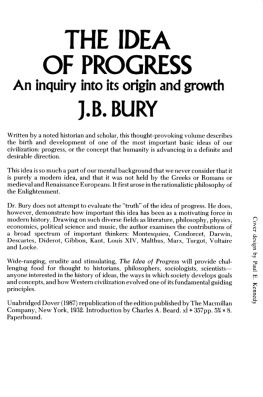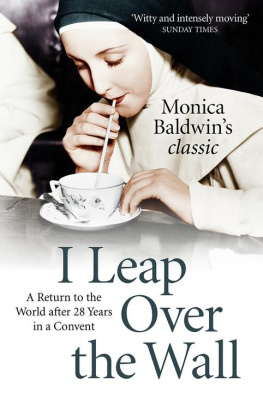THE
IDEA OF PROGRESS
AN INQUIRY INTO ITS ORIGIN AND GROWTH
J. B. BURY
Regius Professor of Modern History and Fellow of Kings College, in the University of Cambridge
Introduction by
CHARLES A. BEARD

Copyright
Copyright 1932 by The Macmillan Company
Copyright 1960 by William Beard and Mrs. Miriam B. Vagts
All rights reserved.
Bibliographical Note
This Dover edition, first published in 1987 and reissued in 2014, is a republication of the 1955 Dover edition, an unabridged and unaltered republication of the 1932 edition as published by The Macmillan Company. This Dover edition is published by special arrangement with St. Martins Press.
International Standard Book Number
eISBN-13: 978-0-486-78066-5
www.doverpublications.com
Dedicated
to the memories of
Charles Franois Castel de Saint-Pierre,
Marie Jean Antoine Nicolas Caritat de Condorcet,
Auguste Comte,
Herbert Spencer,
and other optimists mentioned in this volume.

Tantane uos generis tenuit fiducia uestri ?
PREFATORY NOTE TO THE AMERICAN EDITION
The extended discussion of the idea of progress in recent American writings and the decision of the trustees of the centennial celebration at Chicago to dramatize it in A Century of Progress Exposition make it fitting to bring out an American edition of Professor Burys volume. Here is a scholarly survey of the history of the idea, which all Americans who write or speak about the subject should read. Those who imagine that the idea of progress was lately discovered by the promoters of business enterprise and those who suppose that it is a superficial concept adopted by a superficial age will do well to widen their knowledge and enlarge their understanding by a study of these sober and thoughtful pages. The original text has been reproduced exactly as Professor Bury left it, but an introduction dealing with some of the implications of the theme has been added.
CHARLES A. BEARD.
New Milford, Connecticut,
December, 1931.
INTRODUCTION
By CHARLES A. BEARD
The world is largely ruled by ideas, true and false. Although a British wit has declared that the power which a concept wields over human life is nicely proportioned to the degree of error in it, only a sharp eye can discern the dividing line, between truth and falsehood. Moreover we often discover that an idea which is not in accord with historical facts may become true in practice, at least partially. For example, when Jefferson wrote that all men are created equal, it was easy for his critics to point out obvious discrepancies in physical and mental endowment and in social position, but nevertheless Jeffersons idea wielded a wide empire over the human spirit, worked for the liberalization of institutions, and has become a reality in so far as all men (and women) are theoretically equal before the law.
At all events an idea contains potential energy in no mystical sense. As Fouill says, it is the conscious form taken by our feelings and impulses; every idea covers not only an intellectual act, but also a certain direction of the sensibility and of the will. As a consequence, in a society as in an individual every idea is a force tending more and more to realize its individual end. In other words it is not a mere intellectual conception; it contains within itself a dynamic power to move individuals and nations, to drive them in the direction of effecting the ends and institutions implicit in it. While ideas are sometimes formulated by powerful persons for ulterior designs, they also frequently arise from obscure sources, are cherished for a term by the weak and unimportant, and finally make headway against indifference and suppression to a place of dominance in a whole epoch of civilization.
Although apparently academic and remote, all this has a very practical bearing. Constitutional and democratic government is impossible unless the significance of ideas is recognized. It is founded on the assumption that all social conflicts will be fought out within the framework set by the fundamental law through the exchange of ideas. To government by opinion there is no other alternative except government by violence.
It is not only in politics that ideas are important. They are regnant in every department of civilized lifein art, letters, economy, and social custom. One might almost say that peoples are civilized in proportion as they mingle ideas with their labors and aspirations. Form alone does not give influence and immortality to poetry or prose. Every great writer, as Morley says, gives expression in thought to immense movements of mankind, foreshadowing as well as reflecting. And the ideas of every epoch in history are related, usually with one dominant concept setting the key-tone for the others. Indeed, historians, with good reason, break the story of mankind into ages according to their characteristicsto the outstanding ideas disclosed in events, actions and philosophy. Thus we have an age of despotism, an age of reason, and an age of democracy. Though there is danger of over-simplification in such arrangements, there can be no doubt that whole periods are marked by particular types of thought, particular conceptions of life and its values. Neither statesmen nor artists nor writers can escape their pressures.
Now among the ideas which have held sway in public and private affairs for the last two hundred years, none is more significant or likely to exert more influence in the future than the concept of progress. With a few exceptions ancient writers were imprisoned in a vicious circle: they thought that mankind revolved in a cycle through some series of stages. In the Middle Ages thought and practice were cramped by the belief that man was a sinful creature born to trouble as the sparks fly upward, that the world would come to a close sometime, and that life on earth was not an end in itself but a kind of prelude to heaven or hell. It was not until commerce, invention, and natural science emancipated humanity from thralldom to the cycle and to the Christian epic that it became possible to think of an immense future for mortal mankind, of the conquest of the material world in human interest, of providing the conditions for a good life on this planet without reference to any possible hereafter. In due course, when conditions were ripe, the idea of progress arose in the Western world, and in the volume before us is told in clear language the story of the germination and growth of this fruitful concept.
The author of this volume, the late Professor John B. Bury, of Cambridge University, was a profound scholar and a philosophic thinker. Emphasis must be laid on both aspects of his life and work. He was rigorous in his insistence on exacting research, a critical handling of sources, and the use of scientific methods in ascertaining the truth about persons and events. For the rhetorical historian or philosopher Professor Bury had no patience whatever. In language that could not be mistaken, he condemned all the theorists who tried to conjure explanations of mankinds evolution out of their inner consciousness without reference to the hard patterns of facts which constitute the inescapable substance of history. The attempts of Hegel and Krause to disclose the rational element in the general movement of humanity, Bury characterized as splendid failures, because their systems were marked by insufficient knowledge of facts and details, and both writers sought to impose on the story of social development a rigid framework or scheme which did not fit the realities. The clue to what Hegel called the ultimate design of the universe must be sought, Bury contended, must be found, if at all, in the substance of human experience called history, always with due reference to the facts in the case.














